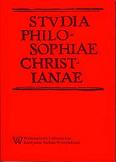The way of ἀνάλυσις: Clement of Alexandria and the Platonic tradition
The way of ἀνάλυσις: Clement of Alexandria and the Platonic tradition
Author(s): Daniel JugrinSubject(s): Philosophy, History of Philosophy, Metaphysics, Ancient Philosphy
Published by: Wydawnictwo Naukowe Uniwersytetu Kardynała Stefana Wyszyńskiego w Warszawie
Keywords: Clement of Alexandria; Platonic tradition; knowledge of God; abstractive way; analysis; aphairesis
Summary/Abstract: In Clement of Alexandria, the three ways of knowing God appear implicitly in the form: the way of analogy, the way of negation (in the mathematical version), and the way of eminence. A basic aspect of the negation appears as an expression of Clementine criticism on anthropomorphism. The Platonic traditional model of via negativa is related to the mathematical theory of abstraction and is defined as a denial of the material things in order to reach the contemplation of God through pure mind: “we start by abstracting the surface, and we are left with the line; we abstract the line, and we are left with the point; we abstract the point, or strictly speaking the monad, and we are then precipitated into the greatness of Christ” (Stromateis V.11.71.2). Clement of Alexandria is, also, one of the authors who emphasize silence and prayer as having great importance in the knowledge process. The cessation of the activity of the senses leads to the supreme state of contemplation with a pure mind. Silence becomes, in this way, a symbol of God, and knowledge – not a matter of speaking, but of being.
Journal: Studia Philosophiae Christianae
- Issue Year: 52/2016
- Issue No: 2
- Page Range: 71-94
- Page Count: 24
- Language: English

